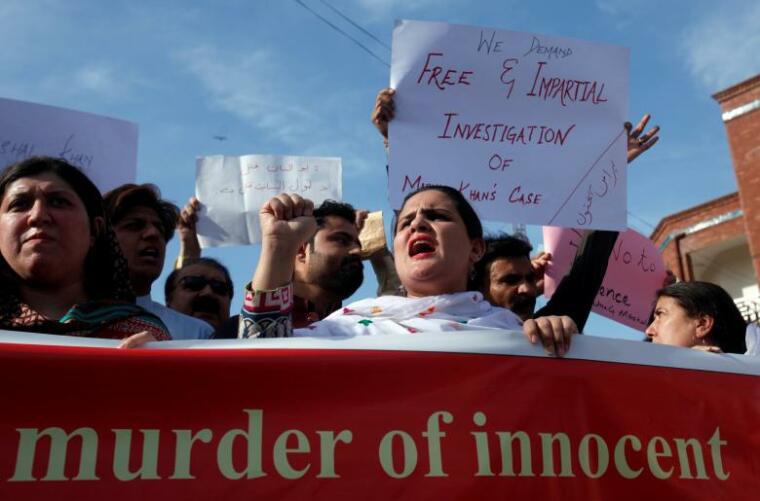Christian families flee village in Pakistan after teen receives death threats over alleged blasphemy

Five Christian families have reportedly fled a village in rural Pakistan after a teenager who has been accused of blasphemy against Islam received death threats.
According to World Watch Monitor, the families, who were the only Christians in the remote village of Sukheki, went into hiding on Friday after a Facebook page posted a photo of the accused teen, Sonu Arshad.
The Facebook page, which reportedly used the logo of a local TV channel, asked locals to "burn his church and give him the death penalty."
A mob has reportedly formed after the local Muslim community's Friday prayers, but the chief of police in the nearby city of Daska said that the situation is now "under control." The police chief further noted that a case has been filed against the unidentified people who were responsible for creating the fake Facebook page.
"There is no evidence that Arshad committed any crime," Tahir Hussain told World Watch Monitor. "This is a fake campaign and the case has been forwarded to the Federal Investigation Agency to identify those who made this fake Facebook page," he continued.
Local Christian councilor Naseer Ghulam said that he had "no knowledge where the family has gone," and added that no one knows the reason for accusing the teen of blasphemy.
Christian groups working in Pakistan have long complained that the country's blasphemy laws are often used by accusers as a way to take revenge and to settle petty personal disputes. Such laws have been used disproportionately against religious minorities, with over a quarter of 702 cases registered between 1990 and 2014 were against Christians, who make up only 1.5 percent of the country's population.
Last week, a 70-year-old Christian who was accused of blasphemy suddenly died before he had the chance to face trial in court.
Mukhtar Masih, who was out on bail, died on Nov. 2 at Bagh Christian Hospital in Mansehra in Khyber Pakhtunkhwa Province, where he was taken after he complained of a pain in the abdomen.
He was accused of pinning a letter containing blasphemous messages to the door of a mosque in the village of Lambanwali, but he had denied the allegations saying no Christian in Pakistan would be foolish enough to take such a risk with his life.
Masih urged the police to examine the writing on the said letter, but they reportedly ignored his request.
Last week, Pakistan's Federal Minister of Religious Affairs and Interfaith Harmony stated that the country's controversial blasphemy law "cannot be revoked."
At least 67 murders have been committed in Pakistan over unproven allegations of blasphemy since 1990, according to figures from a research center and independent records kept by Reuters.
 Christians don't have to affirm transgenderism, but they can’t express that view at work: tribunal
Christians don't have to affirm transgenderism, but they can’t express that view at work: tribunal Archaeology discovery: Medieval Christian prayer beads found on Holy Island
Archaeology discovery: Medieval Christian prayer beads found on Holy Island Presbyterian Church in America votes to leave National Association of Evangelicals
Presbyterian Church in America votes to leave National Association of Evangelicals Over 50 killed in 'vile and satanic' attack at Nigerian church on Pentecost Sunday
Over 50 killed in 'vile and satanic' attack at Nigerian church on Pentecost Sunday Ukrainian Orthodox Church severs ties with Moscow over Patriarch Kirill's support for Putin's war
Ukrainian Orthodox Church severs ties with Moscow over Patriarch Kirill's support for Putin's war Islamic State kills 20 Nigerian Christians as revenge for US airstrike
Islamic State kills 20 Nigerian Christians as revenge for US airstrike Man who served 33 years in prison for murder leads inmates to Christ
Man who served 33 years in prison for murder leads inmates to Christ


 Nigerian student beaten to death, body burned over ‘blasphemous’ WhatsApp message
Nigerian student beaten to death, body burned over ‘blasphemous’ WhatsApp message 'A new low': World reacts after Hong Kong arrests 90-year-old Cardinal Joseph Zen
'A new low': World reacts after Hong Kong arrests 90-year-old Cardinal Joseph Zen Iran sentences Christian man to 10 years in prison for hosting house church worship gathering
Iran sentences Christian man to 10 years in prison for hosting house church worship gathering French Guyana: Pastor shot dead, church set on fire after meeting delegation of Evangelicals
French Guyana: Pastor shot dead, church set on fire after meeting delegation of Evangelicals ‘Talking Jesus’ report finds only 6% of UK adults identify as practicing Christians
‘Talking Jesus’ report finds only 6% of UK adults identify as practicing Christians Mission Eurasia ministry center blown up in Ukraine, hundreds of Bibles destroyed: 'God will provide'
Mission Eurasia ministry center blown up in Ukraine, hundreds of Bibles destroyed: 'God will provide' Church holds service for first time after ISIS desecrated it 8 years ago
Church holds service for first time after ISIS desecrated it 8 years ago Burger King apologizes for 'offensive campaign' using Jesus' words at the Last Supper
Burger King apologizes for 'offensive campaign' using Jesus' words at the Last Supper Uganda: Muslims abduct teacher, burn him inside mosque for praying in Christ’s name
Uganda: Muslims abduct teacher, burn him inside mosque for praying in Christ’s name